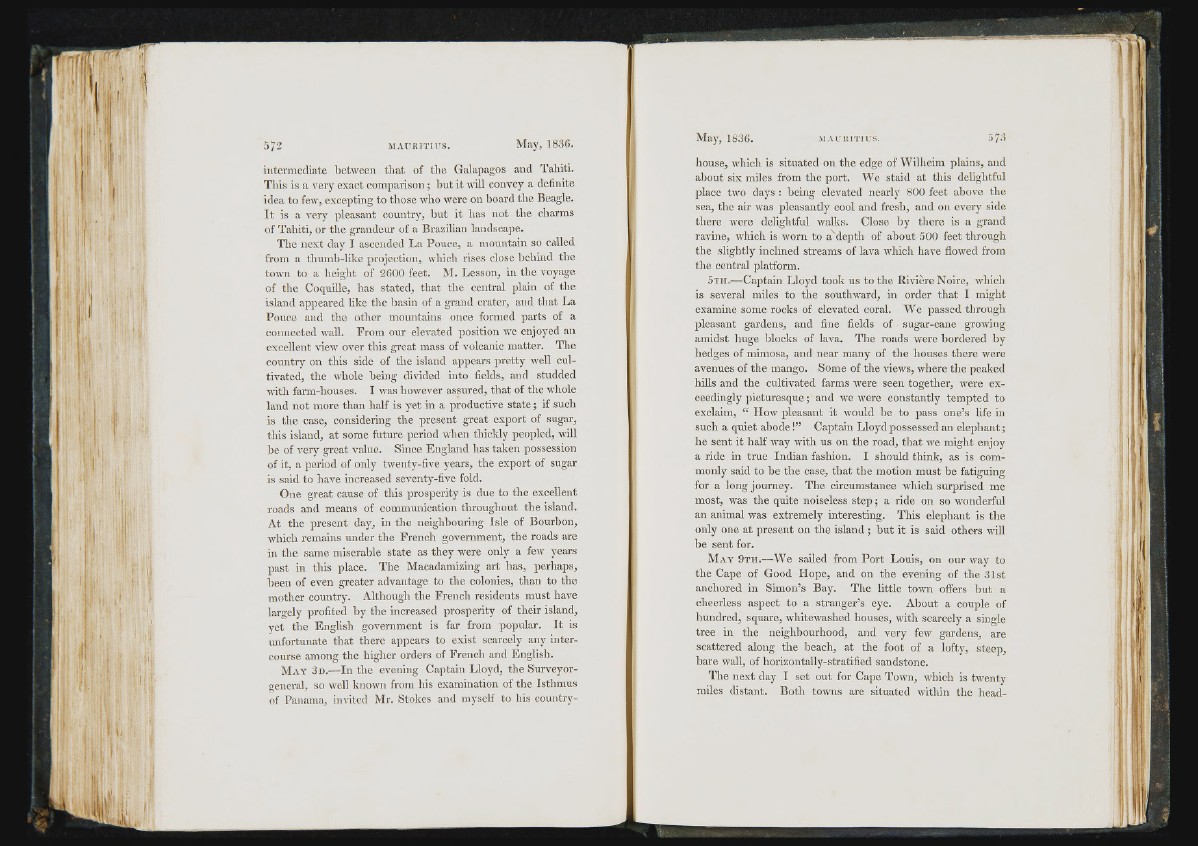
F t
! z Mi:
)ft ii '■• I ■
intermediate between that of the Galapagos and Tahiti.
This is a very exact comparison ; but it will convey a definite
idea to few, excepting to those who were on board the Beagle.
It is a very pleasant country, but it has not the charms
of Tahiti, or the grandeur of a Brazilian landscape.
The next day I ascended La Pouce, a mountain so called
from a thumb-like projection, which rises close behind the
town to a height of 2600 feet. M. Lesson, in the voyage
of the Coquille, has stated, that the central plain of the
island appeared like the basin of a grand crater, and that La
Pouce and the other mountains once formed parts of a
connected wall. From our elevated position we enjoyed an
excellent view over this great mass of volcanic matter. The
country on this side of the island appears pretty well cultivated,
the whole being divided into fields, and studded
with farm-houses. I was however assured, that of the whole
land not more than half is yet in a productive state; if such
is the case, considering the present great export of sugar,
this island, at some future period when thickly peopled, will
be of very great value. Since England has taken possession
of it, a period of only twenty-five years, the export of sugar
is said to have increased seventy-five fold.
One great cause of this prosperity is due to the excellent
roads and means of communication throughout the island.
At the present day, in the neighbouring Isle of Bourbon,
which remains under the French government, the roads are
in the same miserable state as they were only a few years
past in this place. The Macadamizing art has, perhaps,
been of even greater advantage to the colonies, than to the
mother country. Although the French residents must have
largely profited by the increased prosperity of their island,
yet the English government is far from popular. It is
unfortunate that there appears to exist scarcely any inter-
oourse among the higher orders of French and English.
M a y 3 d .— I n the evening Captain Lloyd, the Surveyor-
general, so well known from his examination of the Isthmus
of Panama, invited Mr. Stokes and myself to his countrym
a x ; u i t i u s .
house, which is situated on the edge of Wilhelm plains, aud
about six miles from the port. We staid at this delightful
place two days : being elevated nearly 800 feet above the
sea, the air was pleasantly cool and fresh, and on every side
there were delightful walks. Close by there is a grand
ravine, which is worn to a''depth of about 500 feet through
the slightly inclined streams of lava which have flowed from
the central platform.
5x11.—Captain Lloyd took us to the Riviere Noire, which
is several miles to the southward, in order that I might
examine some rocks of elevated coral. We passed through
pleasant gardens, and fine fields of sugar-cane growing
amidst huge blocks of lava. The roads were bordered by
hedges of mimosa, and near many of the houses there were
avenues of the mango. Some of the views, where the peaked
hills and the cultivated farms were seen together, were exceedingly
picturesque; and we were constantly tempted to
exclaim, “ How pleasant it would be to pass one’s life iu
such a quiet abode!” Captain Lloyd possessed an elephant;
he sent it haE way with us on the road, that we might enjoy
a ride in true Indian fashion. I should think, as is commonly
said to be the case, that the motion must be fatiguing
for a long journey. The circumstance which surprised me
most, was the quite noiseless step; a ride on so wonderful
an animal was extremely interesting. This elephant is the
only one at present on the island ; but it is said others will
be sent for.
M a y 9 t h .—We sailed from Port Louis, on our way to
the Cape of Good Hope, and on the evening of the 31st
anchored in Simon’s Bay. The little town offers but a
cheerless aspect to a stranger’s eye. About a couple of
hundred, square, whitewashed houses, with scarcely a single
tree in the neighbourhood, and very few gardens, are
scattered along the beach, at the foot of a lofty, steep,
bare wall, of horizontally-stratified sandstone.
The next day I set out for Cape Town, which is twenty
miles distant. Both towns are situated within the head-
; f t '
il i -
IJi
i . l I
:P